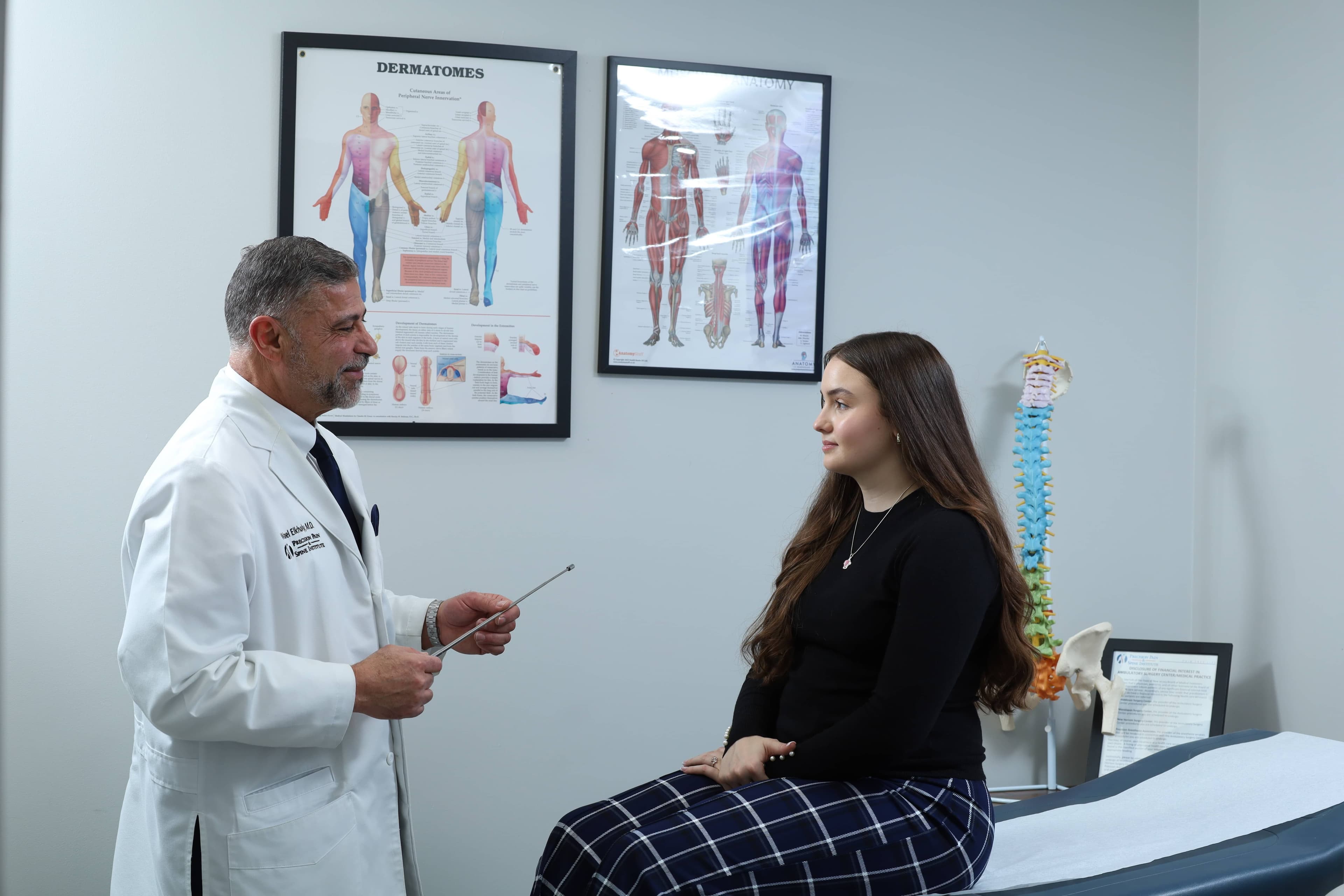Can Stress Cause Migraines? Relationship Between Stress and Headache Disorders
Stress is one of the leading migraine triggers. Learn how emotional strain, muscle tension and lifestyle shifts can spark migraines and what your next step should be.

For many patients, the question rings true: “Can stress cause migraines?” As a physician specializing in pain management, neurology, sports medicine and spine care, I regularly hear about patients whose migraine days rise in tandem with life’s pressure, emotional strain, or work demands.
Migraines are more than just bad headaches. They involve complex neurovascular, genetic and biochemical changes in the brain. Stress may not be the root cause of migraine disorders, but it is one of the most common triggers. Recognizing how stress affects migraines helps you take control of both prevention and treatment.
What Is a Migraine?
A migraine is a neurological disorder characterized by recurrent attacks of moderate to severe head pain often throbbing and unilateral frequently accompanied by nausea, vomiting, sensitivity to light or sound, and sometimes visual disturbances (auras).
Unlike simple tension headaches, migraines involve:
- Altered brain excitability
- Activation of the trigeminovascular system
- Release of neuropeptides such as CGRP (calcitonin gene-related peptide)
- Changes in blood vessel tone and inflammation
These mechanisms are influenced by internal and external factors including stress.
How Stress Can Trigger Migraines
1. Hormonal & Neurochemical Effects
When you experience stress, the body responds via the hypothalamic-pituitary-adrenal (HPA) axis and sympathetic nervous system. Stress hormones (cortisol, adrenaline) change rapidly, and neurotransmitters such as serotonin and norepinephrine are affected. Research shows that these changes may lower the threshold for migraine attacks.
2. Muscle Tension and Postural Strain
Stress often produces muscle tension in the neck, shoulders and scalp. This tension can irritate nerves, reduce circulation, and trigger headaches that evolve into migraines especially in individuals predisposed to migraine.
3. Sleep Disruption & “Let-Down” Phenomenon
Periods of high stress often disrupt sleep patterns. Poor sleep is a well‐recognized migraine trigger. Interestingly, the “let-down” migraine may occur after a stressful period ends when you relax and cortisol levels drop. Many patients report migraine onset during weekends or vacations.
4. Central Sensitization & Chronic Stress
When stress is chronic, pain pathways in the brain and spinal cord may become sensitized (central sensitization). This increases sensitivity to triggers and makes migraine frequency and severity worse. Studies show chronic stress correlates with transformation from episodic to chronic migraine.
5. Indirect Lifestyle Effects
Stress promotes behaviors that themselves trigger migraines: skipping meals, dehydration, caffeine or alcohol overuse, and reduced exercise. These secondary effects of stress often act in combination with physiological stress responses.
Recognizing Stress-Related Migraine Patterns
Signs you may have stress-related migraines include:
- Headaches or migraines that occur during or shortly after stressful periods
- Increased frequency of migraine attacks during work pressure, family conflict, or emotional upheaval
- Migraines that begin during periods of relaxation following stress (the “let-down”)
- Coexistence of neck or shoulder tension, insomnia, irritability, or anxiety
If these patterns apply to you, stress may be a significant contributing factor in your migraine profile.
Diagnosis & When to See a Specialist
When migraines are occurring frequently, interfering with your life, or changing in character, evaluation by a physician is recommended. Typical diagnostic work-up includes:
- Detailed medical history focusing on migraine pattern, triggers, and stress factors
- Physical and neurological examination
- Headache diary to record timing, stress levels, associated symptoms
- Imaging (MRI or CT) in cases of new onset, atypical features, or red flags (e.g., neurological deficits)
If you have migraine more than 15 days a month, consult a headache neurologist to evaluate for chronic migraine and consider preventative strategies.
Managing the Stress–Migraine Connection
Medical Treatments
- Acute therapies: Triptans, NSAIDs, gepants, ditans
- Preventive therapies: Beta-blockers, anticonvulsants, CGRP inhibitors, lifestyle-based prevention
When stress is identified as a trigger, it is vital to manage the underlying migraine disorder with appropriate medical supervision.
Stress Reduction & Behavioral Therapy
- Cognitive Behavioral Therapy (CBT): Helps modify stress responses and coping mechanisms
- Biofeedback & Relaxation Training: Reduces sympathetic overdrive and muscle tension
- Mindfulness, meditation, yoga: Lowers cortisol levels, improves resilience
Lifestyle Modifications
- Maintain consistent sleep schedule and good sleep hygiene
- Regular moderate exercise (150+ minutes/week) to reduce stress and improve pain thresholds
- Balanced diet, regular meals, hydration, limiting caffeine and alcohol
- Use a migraine and stress diary to identify personal patterns and triggers
- Strengthen neck and shoulder posture ergonomic adjustments reduce tension
Preventing Stress-Triggered Migraines
- Identify your stress triggers – Work, family, travel, deadlines, relationship issues
- Implement structural breaks in daily routine – 5-10 minute stretching, deep breathing every hour
- Pre-emptive care during high-stress periods – Use prevention medication or relaxation strategies if you know a stressful week lies ahead
- Avoid “let-down” vulnerability – Anticipate migraine risk after intense stress ends by maintaining routine and rest
- Build resilience – Regular physical activity, social support, adequate sleep, and healthy nutrition
When to Seek Immediate Medical Attention
Although most migraines are not life-threatening, some symptoms require urgent care:
- Sudden “worst headache of my life”
- Headache with fever, stiff neck, confusion, fainting, or seizures
- New headache after head trauma
- Neurological deficits (weakness, vision change, speech trouble)
These signs may indicate conditions other than migraine and need prompt evaluation.
Conclusion
Stress is one of the most potent and common triggers of migraines, particularly in those already predisposed to the disorder. While stress alone does not cause migraine disease, its effects on hormones, muscle tension, sleep, and lifestyle combined significantly raise the probability of an attack.
Managing the stress–migraine connection means more than just reducing external pressure; it involves comprehensive treatment, behavioral change, lifestyle modifications, and coping strategies. If your migraines worsen in times of high stress, consider consulting a headache specialist who understands the complex interplay of neurology, pain management, and lifestyle medicine.
With the right approach, you can reduce migraine frequency, improve quality of life, and regain control.
Frequently Asked Questions (FAQs)
1. Can stress alone cause a migraine attack?
In individuals predisposed to migraines, yes stress often triggers an attack by lowering the brain’s threshold for pain.
2. Why do I get a migraine after I’m done being stressed?
This is called the “let-down” migraine. After high stress ends, sudden changes in cortisol and other chemicals can trigger headaches.
3. Does reducing stress prevent migraines entirely?
Not always. While stress control reduces risk, migraine is multifactorial and other triggers (sleep, diet, hormones) must be managed too.
4. How quickly should I see improvement after managing stress?
Individual response varies. Some see fewer attacks within weeks of better habits; others with chronic migraine may need months and preventive therapy.
5. Are there medications to help with stress-related migraines?
Yes. Preventive medications may be advised when migraines are frequent, and behavioral therapies targeting stress add significant benefit.
Explore Our Services
Need a Consult?

Need a Consult?


